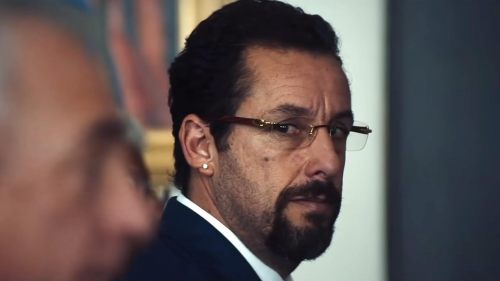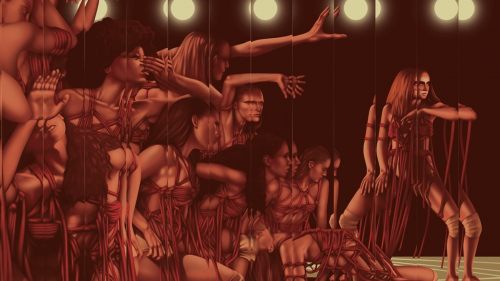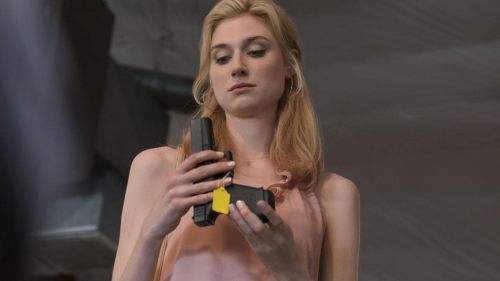Britt’s Top Ten Movies Of 2018
If you're a regular reader of my top 10 lists, then feel free to skip this redundant note: Top 10 lists are arbitrary. Now that I've accepted this, making them is no longer the migraine-inducing chore it once was (or maybe I'm just that well-medicated), but it is still difficult – especially at the end of a year such as 2018, which was filled with amazing cinema (and a few that were exquisitely, amazingly bad). At the end of it all I was left with 19 favorite films, and I can't say it was that easy to exclude nine of them from the final list – especially Halloween, which was a surprisingly emotional exploration of trauma and its effects within a family; or Brady Corbet's Vox Lux, which was a searing examination of the way the American public anoints and interacts with its heroes and celebrities (or in this case, both). Special mention also goes to: Revenge (which subverted the rape/revenge genre in phenomenal ways), Eighth Grade, Destroyer, Never Goin Back, Can You Ever Forgive Me? (note to Melissa McCarthy: more like this, please), and First Reformed.
And don't think I've forgotten about You Were Never Really Here. Lynne Ramsay's film, which reads like pure poetry and features an incredible performance from Joaquin Phoenix, came in at number 11. It was painful to leave out.
As for the top two spots... they're sort of a toss-up. Either one of these could be my number one. They're interchangeable.
Okay, let's do this.

10. Unsane
Steven Soderbergh basically delivered a Gaslight for the modern age, about a woman (Claire Foy) who finds herself trapped in a mental institution due to a shady (and very real) loophole in the health industry. But that's not all: She's also struggling to cope after being stalked by a man (Joshua Leonard cosplaying as Kiefer Sutherland in Freeway), who may or may not be stalking her again by assuming the identity of an orderly. Despite shooting the film entirely on an iPhone (a la Tangerine), there's a classic ’70s psycho-thriller vibe to Unsane – right down to the final freeze-frame.

9. Tully
Jason Reitman is never as good as he is when he works with Diablo Cody; even more so when Charlize Theron is involved. The trio's follow-up to Young Adult (my favorite film of 2011) has lingered in my mind since it was released back in May, and I often find myself thinking about it – not so much the plot details and specific moments, but the dreamlike quality of it, which mirrors the haze in which Theron's mother has found herself wandering following the birth of her third child. While many critics and viewers took issue with the plot "twist," I found it – and its implications – remarkably meaningful. So often movies and TV shows relegate moms to being just that – a mom. Rarely do they feel like fully-actualized people, and it's even more rare that they're portrayed with such complexity, conveying the exhaustive mental lengths they're driven to just to perform this crucial role every single day.

8. The House That Jack Built
Nymphomaniac felt like the perfect punctuation on the end of the sentence that is Lars Von Trier's career. It was like his Dark Tower – the work that brings all of those recurring themes and ideas together in one epic. What do you say after that? The House That Jack Built is the answer to that question; a film that explores Von Trier's relationship with his audience (even and especially the more critical members) and an artist's relationship with his work (as well as Trump's America because sure, why not). It's a cleverly layered piece in which the artist is reimagined as a mysoginistic serial killer (a brilliantly-cast Matt Dillon), allowing Von Trier to interrogate himself, his art, and his shortcomings in what might be his most comedic and deranged film in years.

7. Widows
Steve McQueen and Gillian Flynn made a fierce-ass movie about resilient women overcoming their superficial differences to pull off an ambitious heist after their career criminal husbands die when a job goes sideways. They also made a fantastically complex thriller in which every intricate thread comes together just so, with exceptional performances from all involved. Viola Davis is stunning as a widow whose grief is compounded by past trauma – the shadow of which subtly lingers in the smallest of actions (a sip of carefully-measured booze in the morning). It's those little details that make Widows so damn great. Brian Tyree Henry and Daniel Kaluuya are also impressive, and downright terrifying in their roles as local heavies trying to go legit; their story could make for a great film all on its own. This movie fucking rules.

6. Annihilation
What a gorgeously eerie, unnerving piece of cinema about mental illness – and the ways in which it transforms and consumes us.

5. The Tale
No film in 2018 has cut me straight to the bone and clocked every fiber of my being as hard as The Tale. It's perhaps a little too personal to admit, but Jennifer Fox's first narrative feature (inspired by her own painful life experiences) was the most relatable movie I saw this year – and it might've been the first time that I was legitimately triggered by anything. The Tale centers on Jennifer, a journalist forced to reconcile fragile memory with reality when her mother discovers the "love" letters Jennifer received from her older "boyfriend" when she was just 13. Despite her insistence that she merely "dated" an older man, Jennifer soon begins the difficult work of untangling a complex narrative that she's rewritten time and again – and discovers the horrible truth buried within. It's not an easy watch by an means, but it is such an important one, and it features truly stunning and brave performances from Laura Dern, Elizabeth Debicki, and (maybe most of all, given the subject matter and demands) Jason Ritter.

4. Mandy
I smiled just as hard watching Mandy as I cried while watching The Tale. Panos Cosmatos' latest effort is a psychedelic mind-fuck into the heart of misogynistic darkness. It's like an axe-wielding warrior approached a rusted out van and whispered a Margaret Atwood quote to the death metal font airbrushed on the side, enchanting it into wild, cinematic life. I cried tears of joy. Why aren't all movies this way?

3. Hereditary
Ari Aster's directorial debut is a harrowing odyssey through familial and inherited trauma, examining the sheer horror of mental illness and grief. The imagery in this film is utterly beautiful and terrifying in equal measure, but it's the thematic elements that burrowed into my nervous system and set up shop – this question of whether mental illness is something we can control or if it's an unavoidable inherited burden is truly upsetting in ways that no amount of goblins and ghouls could ever be. Toni Collette deserves 800 motherfucking Oscars for Hereditary, period.

2. The Favourite
I felt like my number one film was set in stone in the moment I saw Suspiria, but then I saw The Favourite. It may be Yorgos Lanthimos' most accessible film to date, but his idiosyncrasies and deranged sense of humor haven't been watered down in the slightest. With sumptuous production and costume design and wicked performances from the holy trifecta of Olivia Colman, Rachel Weisz, and Emma Stone, The Favourite is a sublime piece of work that I'll be rewatching for years to come. Colman is divine as Queen Anne – a petulant ruler who, like certain notable contemporary celebrities, was raised in a little bubble. As such, she's never had to completely care for herself, and her emotional maturity is that of a teen girl on the best of days and a toddler on the worst. She is essentially, entirely id – all wants and desires. But there's also something painfully human about her; it's in her aching loneliness, her need for female companionship and commiseration, her desire for love and intimacy. She is – perhaps bizarrely – the character I related to the most this year. (Maybe it was just the moment when she shoved cake into her face with her bare hands.)

1. Suspiria
I have already written extensively (like, really extensively) about Luca Guadagnino's interpretation of Dario Argento's horror classic. To borrow a term from Tilda Swinton's Madame Blanc, it's more of a rebirth of Argento's film than a remake or reimagining – and it is about so much. Artistry, the intersection of art and commerce, the division of Berlin (reflected within the dance academy itself), psychoanalysis, psychic pain, what makes a passive witness (and the tragedy of learning as much too late), inherent misogyny and man's similar inability to understand or even acknowledge a woman's trauma unless it's gutted and hideously laid bare before him, the power of art, the power of women, power.
It is a rapturous, visceral experience heightened by Tilda Swinton's three roles – each of which represents what Freud believed to be the three components of the human sub-conscious: Ego, super-ego, and id – and grounded by Dakota Johnson's otherwordly performance as the human embodiment of a sigh. I have seen Suspiria three times now (fitting, given its preoccupation with trifectas), and each and every one has illuminated some other stunning little corner of Guadagnino's film for me. It is a nightmarish lullaby, a ballet of feminist confrontation, and so many other things that I cannot wait to discover in the coming years.



